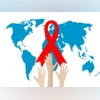Every year on December 1st, people mark World AIDS Day. The purpose of this is to raise awareness of HIV/AIDS, mourning those who have lost their lives due to this illness, and offer support to those living with it. Each year's theme focuses on advocacy and education for a world free of AIDS, highlighting particular aspects of the global struggle against HIV/AIDS.
AIDS (Acquired Immunodeficiency Syndrome) is the advanced stage of HIV (Human Immunodeficiency Virus) infection, followed by the immune system's major impairment. Although it may take years for AIDS to develop after an initial HIV infection, early warning symptoms show that the immune system is deteriorating.
World Aids Day 2024: Theme
The theme for this year's World AIDS Day is “Take the rights path: My health, my right!” which highlights the important role of saving and promoting human rights in the battle against the HIV/AIDS epidemic.
Using the theme, WHO said it is calling on global leaders and citizens to champion the right to health by addressing the inequalities that hinder progress in ending AIDS.
World Aids Day: History
James W. Bunn and Thomas Netter, two public information workers employed by the World Health Organization (WHO) in the Global Programme on AIDS, were the first to start World AIDS Day in 1988.
Also Read
They devised the concept to guarantee better media coverage and increase public knowledge of HIV/AIDS. December 1st was selected because it offered a window of opportunity to attract attention following the US elections but before the holiday season.
What is the significance of World AIDS day?
To increase awareness of HIV/AIDS, a disease that still affects millions of people worldwide, World AIDS Day is essential. Despite tremendous advancements in care, prevention, and treatment, HIV continues to pose a serious threat to public health, particularly in low- and middle-class nations.
The day highlights the value of education, guaranteeing access to life-saving medications, and eradicating prejudice and stigma against people with HIV. It also serves as a reminder that everyone must work together to achieve the goals of zero new infections and zero discrimination.
Aids day 2024: 7 steps to follow
• Practice safe and hygienic sex
• Get tested regularly
• Use pre-exposure prophylaxis (PrEP)
• Avoid contact with blood and bodily fluids
• Get vaccinated against hepatitis
• Avoid sharing needles or syringes
• Seek treatment for STIs.

)